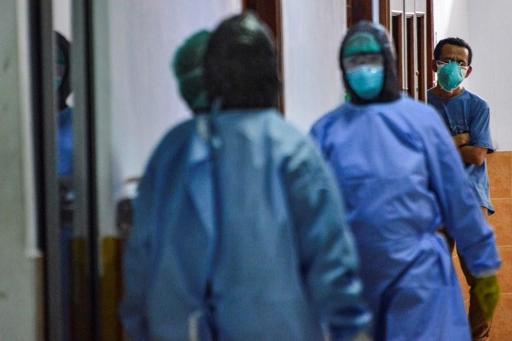The reference laboratory at the Leuven university hospital will have to limit the number of tests for the virus it carries out, after running short of essential reagents.
In a message to general practitioners published on its website, the public health agency Sciensano that the National Reference Centre (NRC) in Leuven “is temporarily forced to introduce a triage system. Priority will be given to the most urgent samples on the basis of clinical information provided [by the GP] on the request form.”
The agency goes on to promise, “the NRC will to everything it can to report back on all samples as quickly as possible.”
The Leuven lab carries out 400 to 500 tests a day, a number which has remained stable.
“Not because demand is slowing, but because we have established criteria that allow us to allocate resources to hospitals and reference centres for the most ill patients, who require a test to have their treatment organised in the best way,” said Emmanuel André, speaking for the NRC.
The result will be that patients who present to their GP with what seems like the flu will not be tested automatically for Covid-19. Tests will only be carried out on patients whose illness is severe enough for them to be hospitalised.
“What is required now is to be calm, to be organised and to find a way to allocate the resources we have to those people for whom we can make a difference. Those people now who develop flu-like symptoms should remain at home and let the illness pass that way,” Dr André said.
Patients who require hospitalisation – a minority of all cases – will at the same time be treated with adequate resources and the utmost vigilance.
According to Professor Marc Van Ranst, who runs the reference lab, the testing service has gone through in six days a stock of chemicals intended to last six months.
“Every lab in every country is now placing orders for the same reagents,” he posted on Twitter. “There are stock shortages worldwide. That is why we of course deal with the most urgent samples first.”
• In other coronavirus news, the epidemic has now passed the 100,000 mark of people infected, with 3,070 deaths and cases in 92 countries.
• Residents in the Dutch province of North Brabant, which borders Belgium, have been ordered to remain indoors at home if they feel sick or display the symptoms of coronavirus. A total of 130 cases have emerged in the Netherlands, the origin of most of which is known. However it is not clear how residents of North Brabant came to be infected. “We want to investigate that further this weekend,” said Jaap van Dissel of the Dutch state institute for public health (RIVM).
• The total number of cases in Belgium has now reached 169, with 60 new cases since Friday midday. “Most of the positive cases have recently been travelling, but we are seeing more and more infections contracted locally,” said a spokesperson for the ministry of public health. “We expect that number to continue rising.”
• The cases so far in Belgium are divided by region: 105 in Flanders, including one recovery; 46 in Wallonia; and 17 in Brussels.
• The industry fair Made in Asia due to take place at Brussels Expo on 13-15 March has been postponed until September. Two other events at Brussels Expo, Autotechnica and Infosecurity, have also been postponed to a later date.
• A baby aged less than one year has been admitted to a hospital in Gosselies by Charleroi, after presenting with symptoms similar to the coronavirus. The parents had recently been on holiday with the baby in a risk area. Tests confirmed the infection, and the hospital said the baby was doing well.
• The second fatality in the UK has been reported: a man in his 80s who died in Milton Keynes university hospital on Thursday.
Alan Hope
The Brussels Times

